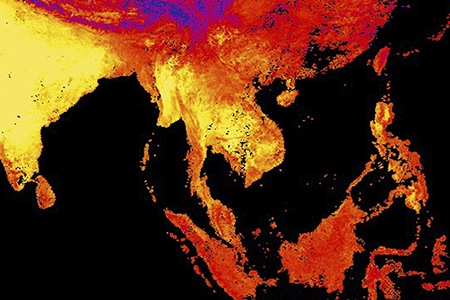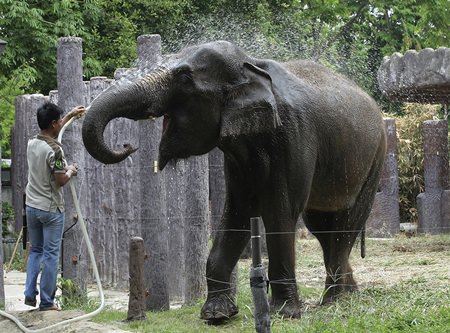Bangkok (AP) – Animals at Bangkok’s zoo are being fed special frozen fruit pops. People are flocking to shopping malls just to soak up the air-conditioning. Authorities are telling people to stay out of the blazing sun to avoid heat stroke.
April in Thailand is typically hot and sweaty, but this year’s scorching weather has set a record for the longest heat wave in at least 65 years.
The average peak temperature each day in April has been above 40 degrees Celsius (104 degrees Fahrenheit), with the mercury spiking one day to 44.3 degrees C (111.7 F) – just short of the all-time record.
 This image released by NASA’s Earth Observatory Team from data collected by the Moderate Resolution Imaging Spectroradiometer (MODIS), an instrument on NASA’s Terra and Aqua satellites, shows the land surface temperature as observed by MODIS in Thailand, center, and surrounding countries from April 15 to April 23, 2016. Yellow shows the warmest temperatures. April in Thailand is typically hot and sweaty but his year’s scorching weather has set a record for the longest heat wave in at least 65 years. (Reto Stockli/NASA Earth Observatory Team/MODIS Land Science Team via AP)
This image released by NASA’s Earth Observatory Team from data collected by the Moderate Resolution Imaging Spectroradiometer (MODIS), an instrument on NASA’s Terra and Aqua satellites, shows the land surface temperature as observed by MODIS in Thailand, center, and surrounding countries from April 15 to April 23, 2016. Yellow shows the warmest temperatures. April in Thailand is typically hot and sweaty but his year’s scorching weather has set a record for the longest heat wave in at least 65 years. (Reto Stockli/NASA Earth Observatory Team/MODIS Land Science Team via AP)
The heat wave has also fueled a new record for energy consumption and prompted health warnings on everything from foodborne illness to drowning, both of which rise every April when Thailand’s hottest month coincides with school summer break.
“As of now we can say we’ve broken the record for the highest temperatures over the longest duration in 65 years – and the season isn’t over yet,” said Surapong Sarapa, head of the Thai Meteorological Department’s weather forecast division. Thailand began keeping national weather records after 1950.
On April 27, in 1960, Thailand posted its hottest day ever recorded with 44.5 degrees Celsius (112 F) in the northern province of Uttaradit.
Countries across Southeast Asia are feeling the heat, which scientists say is triggered by El Nino, a warming of parts of the Pacific Ocean that changes weather worldwide and tends to push global temperatures up. El Nino has also been blamed for causing the worst drought in decades across the region.
Thailand’s Department of Disease Control has warned people to beware of food poisoning and other food-related illnesses that typically increase during hot weather when bacteria can thrive on unrefrigerated food.
“Stay indoors, try to limit activity outdoors. Wear sunglasses, wear hats with large brims. Drink more water than usual,” the disease control center said in a statement. It also reminded of the increased risk of drowning in hot weather as children flock to Thailand’s beaches, ponds and lakes to take a swim.
“Do not let young children out of your sight for even a brief moment,” the statement said, noting that an average of 90 children die every month in Thailand from drowning but that number increases to about 135 in April.
 In this Tuesday, April 26, 2016 photo, a worker at Bangkok’s Dusit Zoo sprays water to cool off a resident elephant. Authorities are telling people to stay out of the blazing sun to avoid heat stroke. (AP Photo/Sakchai Lalit)
In this Tuesday, April 26, 2016 photo, a worker at Bangkok’s Dusit Zoo sprays water to cool off a resident elephant. Authorities are telling people to stay out of the blazing sun to avoid heat stroke. (AP Photo/Sakchai Lalit)
Thais are used to the heat. April typically brings an average of 38-degree C (100 F) days. The current stretch of sweltering weather has been a main topic of conversation, but people are taking it in stride.
“This April is so hot. I’ve got the air conditioner AND fan turned on at home. And I’m keeping ice cream in my fridge at all times,” said Jarossanon Thovicha, a 30-year-old Bangkok resident who works in the fashion industry and is living in fear of her next electricity bill.
“My husband and I have been going out to the mall and spending time there over the weekends to save on electricity at home,” she said.
Nationwide, energy consumption set a record high on Tuesday at 29,004.6 megawatts, said the Electricity Generating Authority of Thailand. It was the latest in a series of peaks reached earlier this month, and EGAT is urging the public not to keep air conditioners on all day.
“We are asking for public cooperation in conserving energy for one-hour a day from 2 p.m. to 3 p.m. until May 20,” the national power utility said in a statement Tuesday.
In Cambodia, the hot weather was blamed for the death of an elephant trained to carry tourists at the famed Angkor Wat temple compound. Local media carried pictures of the pachyderm which collapsed last Friday and quoted the Angkor Elephant company as saying she had apparently died of a heart attack due to high temperatures and lack of wind.
The Dusit Zoo in Bangkok says it’s taking extra precautions so its animals stay safe.
“Monkeys and apes at the zoo are getting fruit popsicles,” said Saowaphang Sanannu, head of conservation and research at Bangkok’s main zoo.
Oranges, watermelon, pineapple and other fruit get chopped up, mixed with fruit juice or water and is then frozen for the chimpanzees, orangutans and other primates. Bears already have waterfall displays in their habitats, so can take dips whenever they want, and are getting the same fruit pops as the others.
“Tigers are getting meat popsicles. We’ll freeze pork legs and chunks of meat to feed them and cool them off at the same time,” Saowaphang said. “Deer, giraffe and elephants get increased shade and sprinklers to provide rain and decrease the heat on the ground.”
Occasional temporary relief is forecast with scattered tropical storms. But it will be brief, with the heat expected to return before tapering off in mid-May when the monsoon rains are expected.
Associated Press Writer Nattasuda Anusonadisai contributed to this report.




